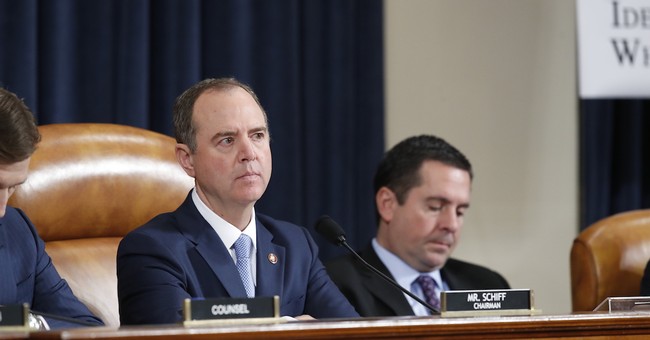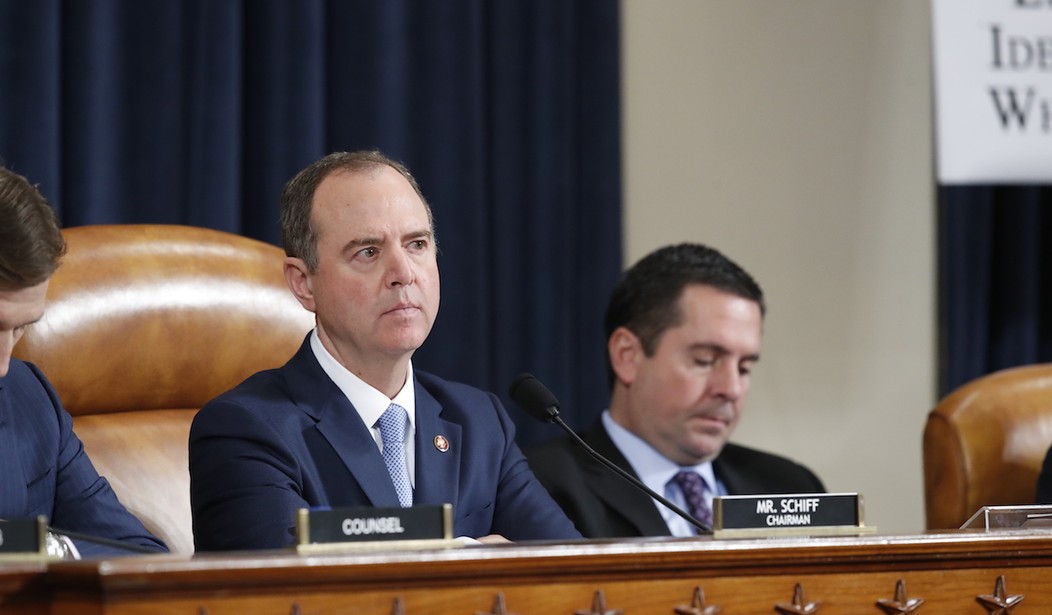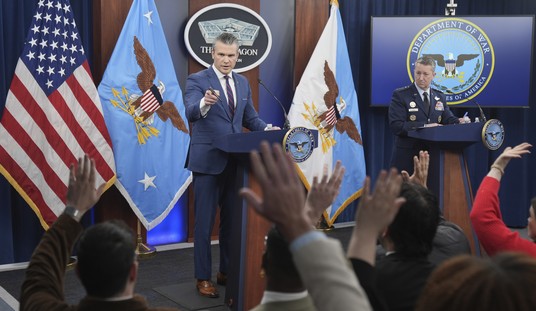
House Intelligence Committee Chairman Adam Schiff, D-Calif., and Rep. Devin Nunes, R-Calif, the ranking member of the House Intelligence Committee, listen to former White House national security aide Fiona Hill, and David Holmes, a U.S. diplomat in Ukraine, testify before the House Intelligence Committee on Capitol Hill in Washington, Thursday, Nov. 21, 2019, during a public impeachment hearing of President Donald Trump’s efforts to tie U.S. aid for Ukraine to investigations of his political opponents. (AP Photo/Alex Brandon)
During the House impeachment proceedings, Rep. Adam Schiff (D-CA) released a report which included the phone records that included calls made or received by Rep. Devin Nunes(R-CA), journalist John Solomon, Rudy Giuliani, and others. The records in the report didn’t contain the content of the conversations but included who called who and how long the call lasted.
The belief was that the records were obtained through subpoenas to the phone companies of records related to Giuliani and Lev Parnas, with the obvious purpose meant to try to impugn the people whose records were included without reason or cause.
What made it especially troubling was Schiff wouldn’t explain who was subpoenaed or how, and if it was a Congressional subpoena straight to the companies, it was a troubling abuse of power.
Now, as Kim Strassel at the Wall Street Journal is reporting, the FCC Commissioner, Brendan Carr, is calling Schiff out over what he believes are abuses of his subpoena power and Carr wants answers. Strassel called it an “incredible abuse” with Schiff publishing call records of his political rivals including Nunes, even the President’s attorney, Rudy Giuliani. Schiff even smeared Nunes during a press conference with the records, trying to suggest that Nunes was somehow “complicit.”
While Carr acknowledged that there might be instances in which Schiff could subpoena call records, Carr said the problem was that Schiff did this in secret, without giving the people whose records were grabbed the opportunity to respond or fight the request.
If that’s allowed, that’s a tremendous abuse of power if members of Congress can just demand phone records from the phone company about any American without any court and without any check.
Chairman Schiff has been collecting Americans’ private call records through a secret & partisan process.
He even published some of them in the Impeachment Report.
These sensitive records are protected by federal law.
His conduct raises serious concerns & I’ve asked for answers https://t.co/WrdGf1n1P2
— Brendan Carr (@BrendanCarrFCC) March 12, 2020
Carr sent Schiff’s House Intel Committee a formal letter not only calling out their prior actions, but indicating that Schiff/the Committee may still be getting people’s records.
2. By proceeding in secret, Schiff deprived Americans – from private citizens to his political opponents to a journalist – of their legal right to go to court and seek to maintain the confidentiality of their sensitive call records.
Here is my letter.: pic.twitter.com/aXPGVlwWIi
— Brendan Carr (@BrendanCarrFCC) March 12, 2020
3. As a country, are we comfortable with one political party in Congress having the unilateral & unchecked power to secretly obtain & publicize the confidential call records of any private citizen, journalist, or government official?
Chairman Schiff has been doing exactly that.
— Brendan Carr (@BrendanCarrFCC) March 13, 2020
Carr points out in his letter that Schiff isn’t allowed to get the records from the phone company without consent from the citizen or in accordance with the law — that there has to be judicial review. Nor did they establish any legitimate legislative purpose in subpoenaing the records.
Moreover, as Carr notes, the recent decision involving the subpoena to former White House Counsel Don McGahn has now established that the subpoena power of the Congress as to such things might be questionable, without a court check on possible abuse of power.
FCC’s Carr calls on Congress to address Schiff’s snooping as part of its surveillance debate, and also holds out possibility of FCC action.
— Kimberley Strassel (@KimStrassel) March 12, 2020
Yes, please. It’s about time. Carr mentions substantial fines in his letter but there may be further action that could be taken.













Join the conversation as a VIP Member